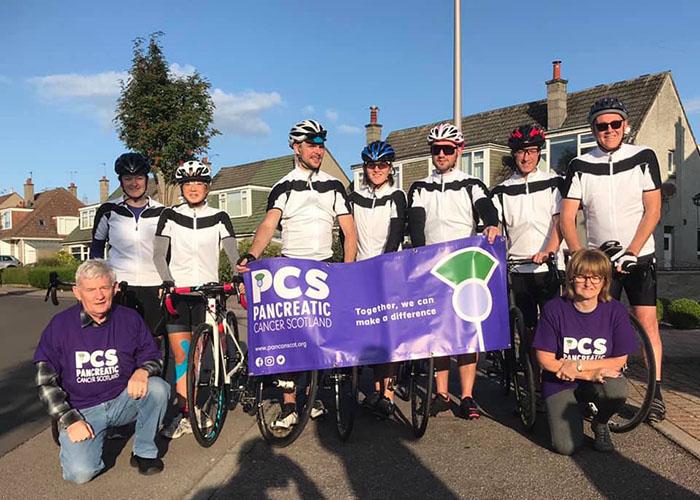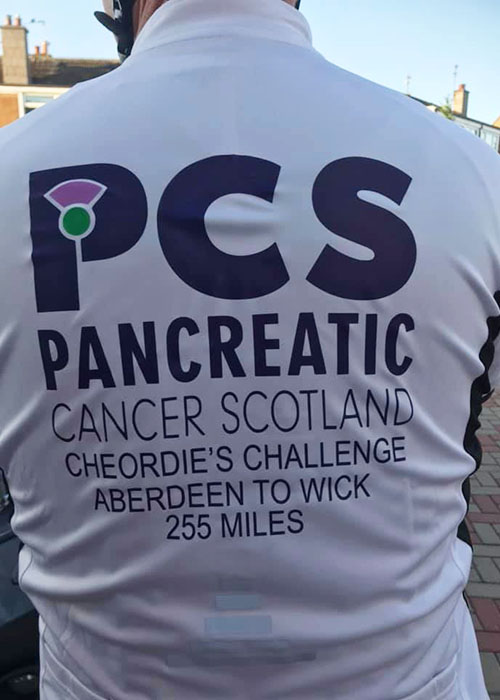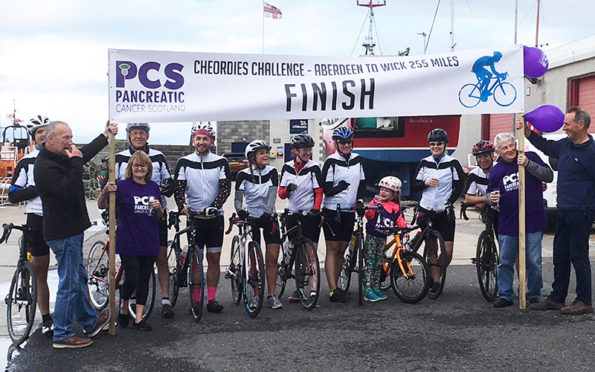Today marks World Pancreatic Cancer Day. This global movement is driven by the need to raise awareness of the symptoms and risks of the world’s toughest cancer, and the urgency for earlier diagnosis to improve patient outcomes.
Brenda Mortimer and her family have already made an impact. Brenda’s late husband, George, had planned to cycle from Aberdeen to Wick. Sadly, he never made the journey. He passed away in September 2018, just six weeks after receiving a pancreatic cancer diagnosis.
Brenda said: “I retired in May and then George was diagnosed in July, sadly we never got much of a retirement together. We’re both from Wick and George had always wanted to do this cycle.”
On September 6, the first anniversary of George’s passing, the family arrived in Wick after completing the 255-mile cycle from Aberdeen, which took three to four days. They raised around £8,000 for Pancreatic Cancer Scotland (PCS), a charity that is committed to raising awareness, improving education, healthcare, research and support for patients and families in Scotland whose lives have been touched by pancreatic cancer and associated tumours.

The group of seven cyclists (pictured above) comprised daughters Amee and Lisa, son-in-law Callum, brother-in-law Tom, niece Lauren and husband Graham, and nephew Scott.
Providing back-up support were Brenda, George’s sister Bibis and brother Jackie, who had travelled from America.
George (Cheordie) had always planned to do this journey with keen cyclist Graham, who ended up cycling George’s custom-made top-of-the-range bike.
Brenda said: “It was important that George’s bike went to Wick, it wasn’t an old banger that’s for sure.
“We got wet, it was a challenge, but they didn’t moan, they hit it head on every day. I thought it would be a terrible three days, but we had a laugh. It was a good experience to share with the family, and for a reason, for George.”
Brenda also surprised daughter Amee, who lives in Canada, by flying in her boyfriend from Florida. Despite a hurricane in Orlando, a closed airport, a missed connection and a rerouted journey – he made it to Wick for 10pm to join the family in George’s favourite club.
Brenda said: “It was quite a week of organising. I wanted someone there for her. She never expected him arriving in Wick at 10pm on a Friday night.
“I’d also like to thank all our supporters in Aberdeen and Wick.”

George, who was 61, was a marine engineer and had become concerned about pains in his stomach.
Visits to the doctor and subsequent tests revealed a pancreatic cancer diagnosis.
Brenda said: “He was a fit man, he went to the gym and cycled. In photos eight weeks before he died, he looked his normal self.
“He started complaining about his stomach. He felt there was something wrong and it went from pain to severe pain.”
In nearly every country, pancreatic cancer is the only major cancer with a single-digit, five-year survival rate (2-9%). These numbers have barely changed in the last five decades.
In Scotland, approximately 800 people a year are diagnosed with pancreatic cancer.
With a predicted increase of 49.9% by 2027, PCS is determined to increase survival rates and stop pancreatic cancer becoming the second-largest cause of cancer death.
Fiona Brown, development manager of PCS, explains: “Pancreatic cancer doesn’t present in an obvious way. It’s not possible to feel a lump like other cancers and the symptoms can be vague, poorly understood and often dismissed as less serious health concerns.”
There is currently no standard screening test or early detection method for pancreatic cancer, though research is being conducted in these areas. Knowing the symptoms and risks remains key to an early diagnosis to give patients the best chance of survival. Research shows that patients diagnosed in time for surgery are more likely to live five years and beyond.
Yet, new statistics from a survey by Pancreatic Cancer Action (PCA) reveal that 73% of Scottish residents cannot name one symptom of pancreatic cancer.
Symptoms can include jaundice, weight loss, abdominal pain, backache, loss of appetite, new onset diabetes, changes to bowel habits, deep vein thrombosis, low mood or depression. These symptoms can, however, also be attributed to other less serious causes and common conditions, but if people have concerns and persistently experience one or more of the symptoms, which are not normal for them, they should make an appointment with their GP.
With little improvement in pancreatic cancer survival rates in the last 50 years, PCS has a vision to make the 2020s the decade of change. The charity has launched the Pan Can Clan to bring together a growing and inspiring community.
From Aberdeen to Wick and Africa, George’s story travels across the world. This June, former workmate Larry and his son Jake will climb Kilimanjaro in George’s memory and to raise money for PCS.
Fiona explained: “Supporters like Brenda, her family, friends and colleagues play a key role. Their voice, energy, determination and commitment will help change the pancreatic cancer story across the world.
“Their inspiring dedication helps raise funds and awareness and fully embraces our belief that together we can make a difference.”
*To join the Pan Can Clan and raise awareness or funds for pancreatic cancer, visit Pancreatic Cancer Scotland website by clicking here.
